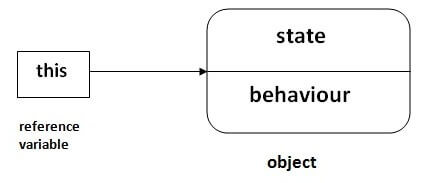Interview :: Core Java
As we know that the static context (method, block, or variable) belongs to the class, not the object. Since Constructors are invoked only when the object is created, there is no sense to make the constructors static. However, if you try to do so, the compiler will show the compiler error.
The this keyword is a reference variable that refers to the current object. There are the various uses of this keyword in Java. It can be used to refer to current class properties such as instance methods, variable, constructors, etc. It can also be passed as an argument into the methods or constructors. It can also be returned from the method as the current class instance.

There are the following uses of this keyword.
- this can be used to refer to the current class instance variable.
- this can be used to invoke current class method (implicitly)
- this() can be used to invoke the current class constructor.
- this can be passed as an argument in the method call.
- this can be passed as an argument in the constructor call.
- this can be used to return the current class instance from the method.
No, this cannot be assigned to any value because it always points to the current class object and this is the final reference in Java. However, if we try to do so, the compiler error will be shown. Consider the following example.
Output
Test.java:5: error: cannot assign a value to final variable this this = null; ^ 1 error
Yes, It is possible to use this keyword to refer static members because this is just a reference variable which refers to the current class object. However, as we know that, it is unnecessary to access static variables through objects, therefore, it is not the best practice to use this to refer static members. Consider the following example.
Output
10
Constructor chaining enables us to call one constructor from another constructor of the class with respect to the current class object. We can use this keyword to perform constructor chaining within the same class. Consider the following example which illustrates how can we use this keyword to achieve constructor chaining.
Output
ID: 105 Name:Vikas age:22 address: Delhi
As we know, that this refers to the current class object, therefore, it must be similar to the current class object. However, there can be two main advantages of passing this into a method instead of the current class object.
- this is a final variable. Therefore, this cannot be assigned to any new value whereas the current class object might not be final and can be changed.
- this can be used in the synchronized block.
Inheritance is a mechanism by which one object acquires all the properties and behavior of another object of another class. It is used for Code Reusability and Method Overriding. The idea behind inheritance in Java is that you can create new classes that are built upon existing classes. When you inherit from an existing class, you can reuse methods and fields of the parent class. Moreover, you can add new methods and fields in your current class also. Inheritance represents the IS-A relationship which is also known as a parent-child relationship.
There are five types of inheritance in Java.
- Single-level inheritance
- Multi-level inheritance
- Multiple Inheritance
- Hierarchical Inheritance
- Hybrid Inheritance
Multiple inheritance is not supported in Java through class.
There are various advantages of using inheritance in Java that is given below.
- Inheritance provides code reusability. The derived class does not need to redefine the method of base class unless it needs to provide the specific implementation of the method.
- Runtime polymorphism cannot be achieved without using inheritance.
- We can simulate the inheritance of classes with the real-time objects which makes OOPs more realistic.
- Inheritance provides data hiding. The base class can hide some data from the derived class by making it private.
- Method overriding cannot be achieved without inheritance. By method overriding, we can give a specific implementation of some basic method contained by the base class.
The object class is the superclass of all other classes in Java.
